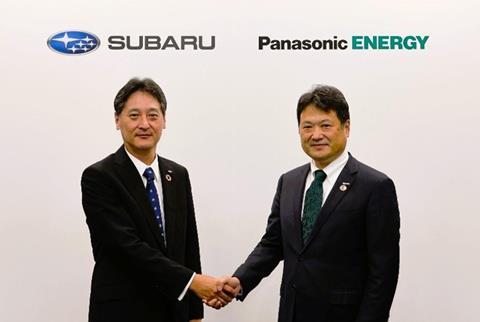Panasonic Energy will supply Subaru with lithium-ion batteries to power the battery EVs (BEVs) the Japanese carmaker will produce in the second half of this decade. The two companies are also opening a jointly owned battery factory in Oizumu in Japan’s Gunma prefecture.
Subaru began discussing a medium to long-term partnership with Panasonic Energy back in July 2023. The aim of the partnership is to meet demand for (BEVs) and automotive batteries in a rapidly expanding market.

Subaru has announced plans to make BEVs account for 50% of its projected 1.2m global vehicle sales in 2030. To support that Panasonic Energy said it will supply cylindrical lithium-ion batteries at its Suminoe gigafactory in Osaka from 2027 and at the new Oizumi gigafactory from 2028. Subaru has four plants in Gunma prefecture, at Ota.
Panasonic said the annual production capacity for battery cells at the two facilities is planned to reach 20GWh by 2030, significantly increasing Panasonic Energy’s domestic production capacity.
The companies said the partnership would contribute to the strengthening of Japan’s supply chain for cylindrical automotive lithium-ion batteries, while also expanding and enhancing Japan’s manufacturing base.
“Through this collaboration, we are poised to drive the expansion of EVs and boost the competitiveness of Japan’s battery industry,” said Kazuo Tadanobu, president and CEO of Panasonic Energy. “Our ultimate goal is to foster a sustainable society, and we are dedicated to achieving this mission.”
Subaru is not abandoning the internal combustion engine (ICE), exploring new engine technology that will decarbonise them. In June the company announced it is working with rivals Toyota and Mazda to optimise engines, make them more compact and able to run on carbon neutral fuels that can be used with hybrid drivetrains.
“As we continue to refine electrification technology, we will also enhance our horizontally opposed engines with an aim to use carbon-neutral fuels in the future,” said Atsushi Osaki, representative director, president and CEO of Subaru. “Moving forward, the three companies sharing the same aspiration will continue to advance the pursuit of sustainable excellence in Japanese car manufacturing.”

























![Global[1]](https://d3n5uof8vony13.cloudfront.net/Pictures/web/a/d/s/global1_726550.svgz)













No comments yet